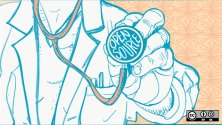The premise of a feedback loop is simple: Give people real-time information about their actions, and they're more likely to change those actions for the better.
Teague designers discovered the power of a feedback loop when they hooked up a water meter to their office hand-washing sink. When the device provided followup feedback, they discovered no change in behavior. But when they hooked an iPad to the device displaying real time feedback, people's behaviors changed dramatically. They cut their water usage by 75% on average.
In another experiment, Garden Grove had problems with drivers speeding through school zones. When they installed dynamic displays showing drivers their current speed as well as the posted limit, drivers slowed an average of 14%.
In each of these instances we see that real-time monitoring gives people the opportunity to immediately alter their behavior for the better.
So, what would happen if we apply this powerful tool to human health?
The largest problem in medicine is noncompliance, the term for patients who don’t follow their doctor's prescribed orders. Studies show that half of all patients do not take prescribed medication as directed. Noncompliance adds $100 billion annually to US health care costs and leads to 125,000 unnecessary deaths from cardiovascular diseases alone every year—just from people failing to do what they know they should.
"People in general are disconnected from seeing the results of their health choices. We don't see our arteries clogging up because of the two donuts we eat every morning for breakfast," Susannah Fox, associate director for digital strategy at Pew, told eWEEK. "We lack these feedback loops that let us know you're doing the right thing [or] you're not doing the right thing," Fox said.
At SXSW, Aza Raskin (@azaaza), founder of the startup Massive Health, talked about how feedback loops can help change patient behavior. He used cake to demonstrate that people do not consider a cumulative negative effect on health. When an individual eats one piece of cake (and knows that he shouldn’t), there is no immediate consequence. Therefore that slice of cake becomes part of a long-term feedback loop with consequences way too far off in the future to encourage the desired good health behavior. He believes we must find a way to make it easier for people to adhere to good behaviors for the duration of long feedback loops by either breaking them down into shorter feedback loops (giving frequent or instant feedback to people on how well they are doing) or by rewarding people for behavior modification.
Until recently, capturing data was cumbersome. But with the rise of inexpensive sensors and big data processing, we can capture, digitize, and crunch data passively with virtually no friction and infinite scalability.
With cheaper and better accelerometers, inductance sensors, RFID chips, and GPS sensors, monitoring can now be built into tennis shoes, prescription pill bottles, and toothbrushes. And with the rise of the open data movement enabling tremendous growth in mobile health applications, a mobile-enabled feedback loop has a lot of potential for healthcare.
The GlowCap, a plug-in unit that connects to a database that knows a patient’s particular dosage directions starts to pulse increasingly more urgently with a gentle orange light and then soft music until the pill bottle is opened, is one successful example of a feedback loop improving human health.
Massive Health is another group currently making products that sit in your pocket and give you deep insight into your health. They invite you to get involved in beta testing the early versions of their products. Go ahead, get involved, and provide your feedback.
Other start-ups to watch include GreenGoose, hellohealth, fitbit and Hea!thrageous.
Image credits: Instagram Feedback Loop, Lo-fi filter by Fred Benenson






1 Comment